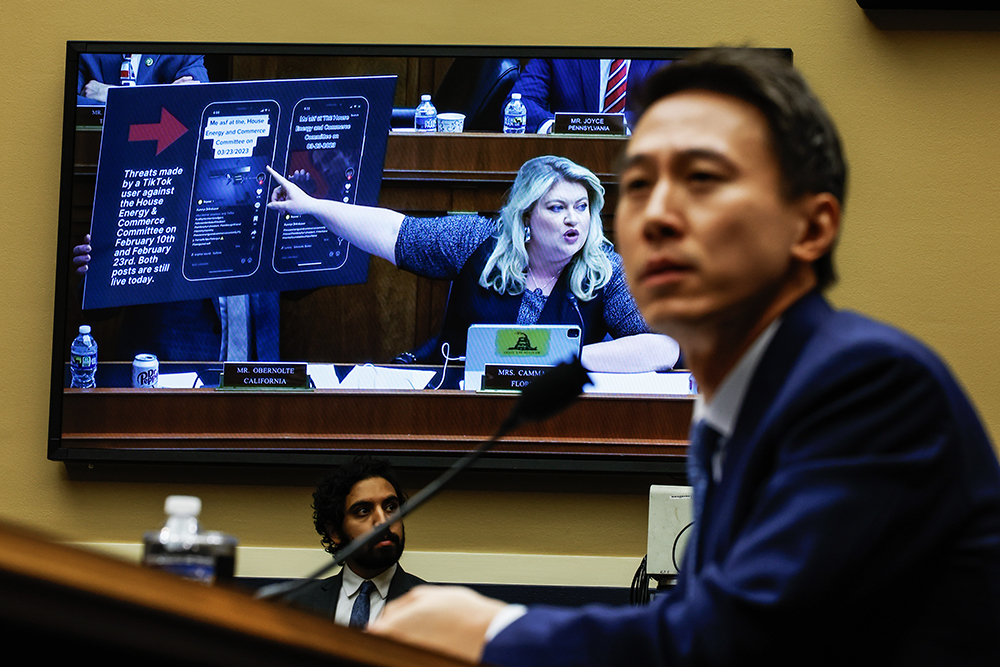
TikTok’s CEO, Shou Zi Chew, did what he could. Dressed in a crisp blue suit and a light blue tie, the former investment banker began his testimony to the US House Energy and Commerce Committee on Thursday (23 March) with the story of his own background.
“I’m from Singapore,” Chew told the congressmen and women on the committee. “That’s where I was born, as were my parents, and after serving in Singapore’s military, I moved to the UK to attend college, and then here to the US to attend business school.” His tone was earnest and respectful as he stressed his personal connections to the United States. “I actually met my wife here by the way, she was born just a few miles away from here in Virginia.” He gestured over his shoulder to indicate just how close this was. The underlying message: I am not from China.
The main task for Chew, 40, who took over as TikTok’s CEO in 2021, was to convince the committee that the platform does not pose a security risk to the US because its parent company, ByteDance, is based in China. With relations between the US and China rapidly deteriorating, lawmakers in Washington have become increasingly fixated on the app, which now has more than 150 million monthly users in the US. Their main concerns are twofold: that American users’ data could be accessed in China, where a 2017 law requires all organisations and citizens to co-operate with “state intelligence work”; and that the platform could be used to manipulate public opinion given its growing popularity as a source of news.
Chew had come prepared with details of TikTok’s proposed solution: a $1.5bn project that will store US users’ data in Texas on servers run by the American cloud computing company Oracle. Codenamed “Project Texas”, Chew said that this would create an impenetrable “firewall” around US data. Reading from his notes, he summed up the plan: “American users’ data, stored on American soil, by an American company, overseen by American personnel.”
The committee was unimpressed.
[See also: Banning TikTok will bring on the splinternet]
“As you state in your testimony, ByteDance is TikTok’s parent company,” Cathy McMorris Rodgers, the Republican chairwoman, responded tersely. She pressed him on his communications with ByteDance executives in Beijing and how he could guarantee that China-based employees could not access sensitive data on US citizens, pointedly reminding him that making false statements to Congress was a federal crime. In response, Chew repeatedly noted that ByteDance was a private company, and that it was not owned or controlled by the Chinese government, as he reiterated the steps TikTok was taking to protect US users’ data.
“Can you say with 100 per cent certainty that ByteDance or the CCP [Chinese Communist Party] cannot use your company, or its divisions, to heat content to promote pro-CCP messages for an act of aggression against Taiwan,” Rodgers continued, referring to the process of boosting certain videos.
“We do not promote or remove content at the request of the Chinese government,” Chew began, but Rodgers interrupted him. “The question is,” she repeated, “are you 100 per cent certain that they cannot use your company to promote such messages?”
“It is our commitment to this committee and all our users that we will keep this free from any manipulation by any government,” he tried again.
“If you can’t say you are 100 per cent certain, then I take that as a no,” Rodgers cut in.
[See also: Is the clock ticking for TikTok?]
It was a rough start to the hearing for Chew, and from there it only got worse. Over the next five hours, more than 50 lawmakers repeatedly interrupted Chew, demanding “yes or no” answers to their questions and expressing clear scepticism of his Project Texas plan.
TikTok has long maintained, and Chew repeated in his testimony, that it has never shared, or received a request to share, US user data with the Chinese government, and that it would not do so if asked. Moreover, the company insists that its new system to store US data in Texas can satisfy these security concerns. Yet the lawmakers were not convinced. The need to take a tougher line on China and to rein in big technology companies are two of the very few issues the divided Congress agrees on. TikTok sits at the nexus of both.
The Senate passed a bill to ban the use of TikTok on all government-issued devices in December, and more than two dozen states have introduced similar restrictions. This month the Biden administration threatened an outright ban on TikTok unless it is sold to a US-based company. The tenor of Thursday’s hearing suggested it will be difficult for the company to shift the US political narrative.
It was not a good day for TikTok’s prospects in the US. In the hours before Chew’s testimony, a spokesperson for China’s commerce ministry announced that Beijing would “firmly oppose” a move to force the sale of TikTok. Multiple committee members seized on the comments as supposed evidence of the precise link that the company insists does not exist.
“The CCP believes they have the final say over your company,” Rodgers told Chew. “I have zero confidence in your assertion that ByteDance and TikTok are not beholden to the CCP.” She described the app as a threat to national security, US citizens’ privacy and the mental health of the country’s children, telling Chew: “Your platform should be banned.”
[See also: Your therapist shouldn’t be on TikTok]



